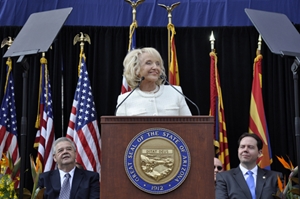
Even though the Patient Protection and Affordable Care Act hasn't fully gone into place as of yet, the White House has spent nearly $4 billion on creating the system needed to have it in place.
According to federal figures collected by the Washington Examiner, approximately $3.8 billion has been spent creating the ACA since the bill was drafted in 2010 and several states have received nine figures in grants to put toward the health insurance marketplaces that will be set up at the state level. For example, California has received $910 million – more than any other state.
Additionally, the Washington Examiner reports that these costs will likely exceed the $5 billion threshold once all of the states launch their insurance exchanges, some of which are scheduled to be operated by both state and federal officials.
Recently, the nonpartisan public policy group the Commonwealth Fund issued a report on 17 states that have chosen to establish state-based exchanges.
"These findings suggest that states capitalized on the flexibility provided by the Affordable Care Act to tailor their exchanges to their unique needs and made decisions with an eye towards outcomes, such as enrollment, consumer experience, and sustainability," the report found. "These findings also suggest that states' initial decisions will inform future exchange implementation and that states will adjust their decisions while continuing to adopt innovative approaches to accomplish policy goals."
States are also responsible for setting up Small Business Health Options exchanges, which company managers and CEOs are permitted to use to make employee benefits available to their workers. The report found that all the states analyzed defined "small employer" as those in which there were 50 or fewer full-time employees on the payroll.
Business owners who have under 50 workers are not required to provide health coverage for their employees. Those who have more than this total are mandated to make benefits available by January 2015.





